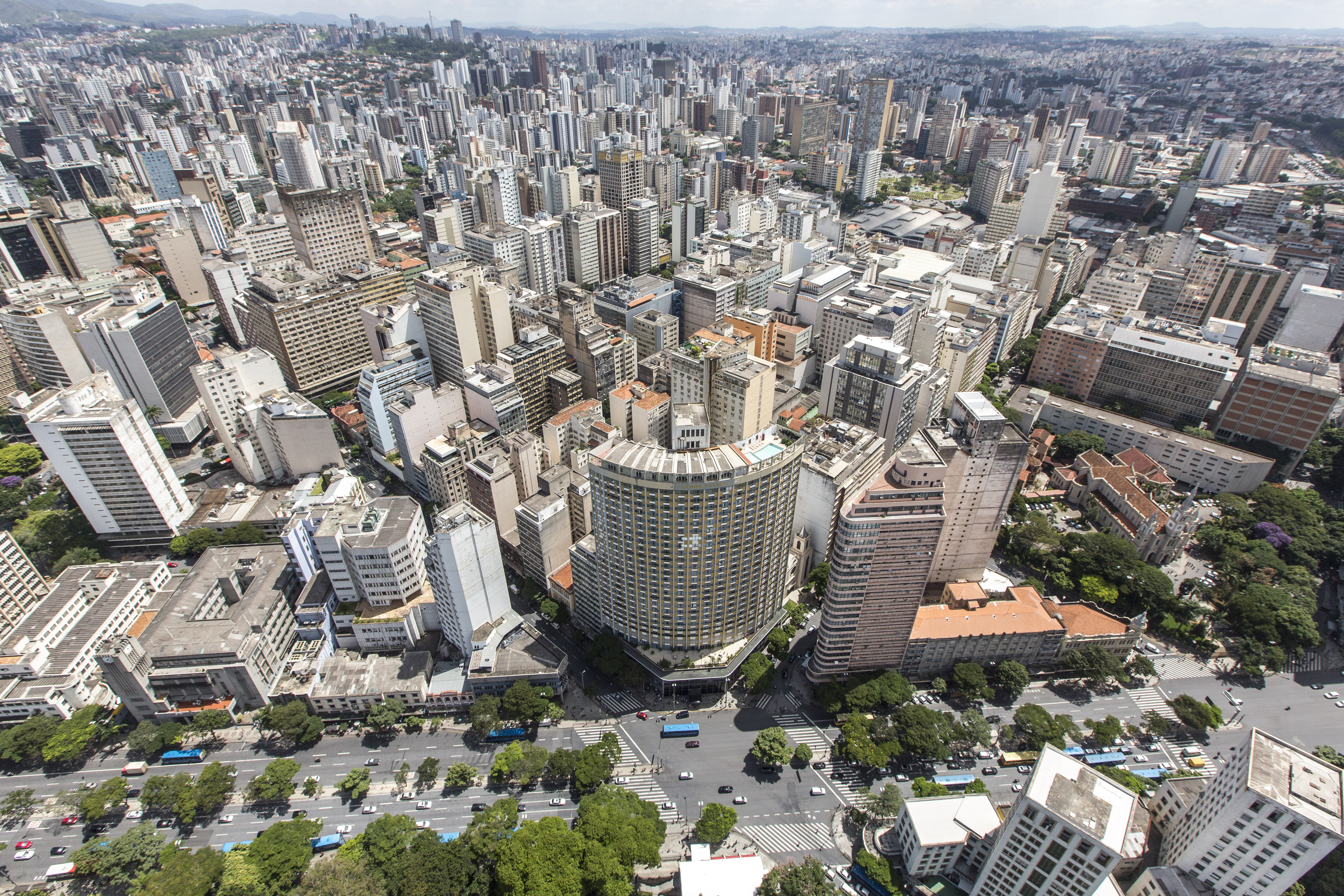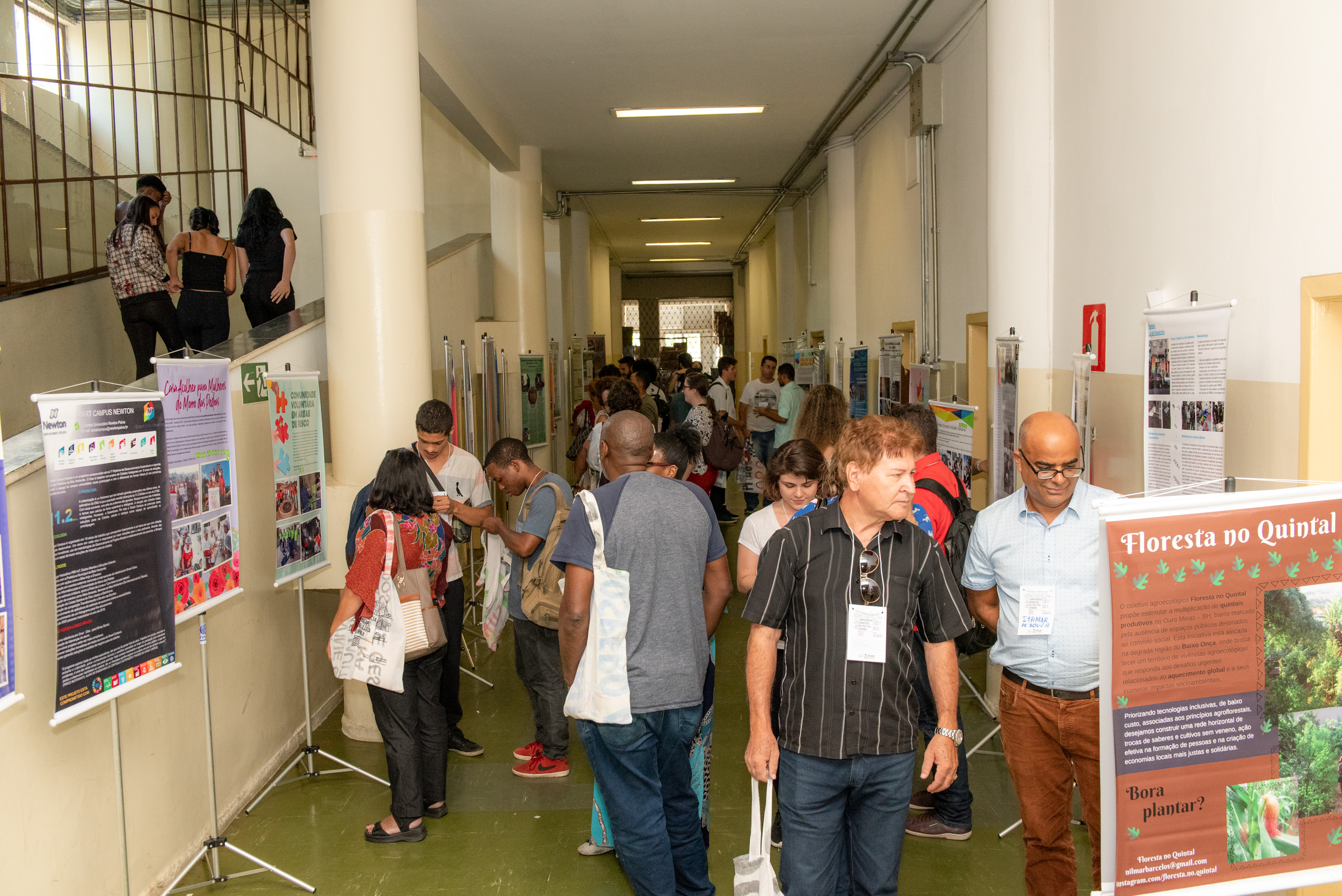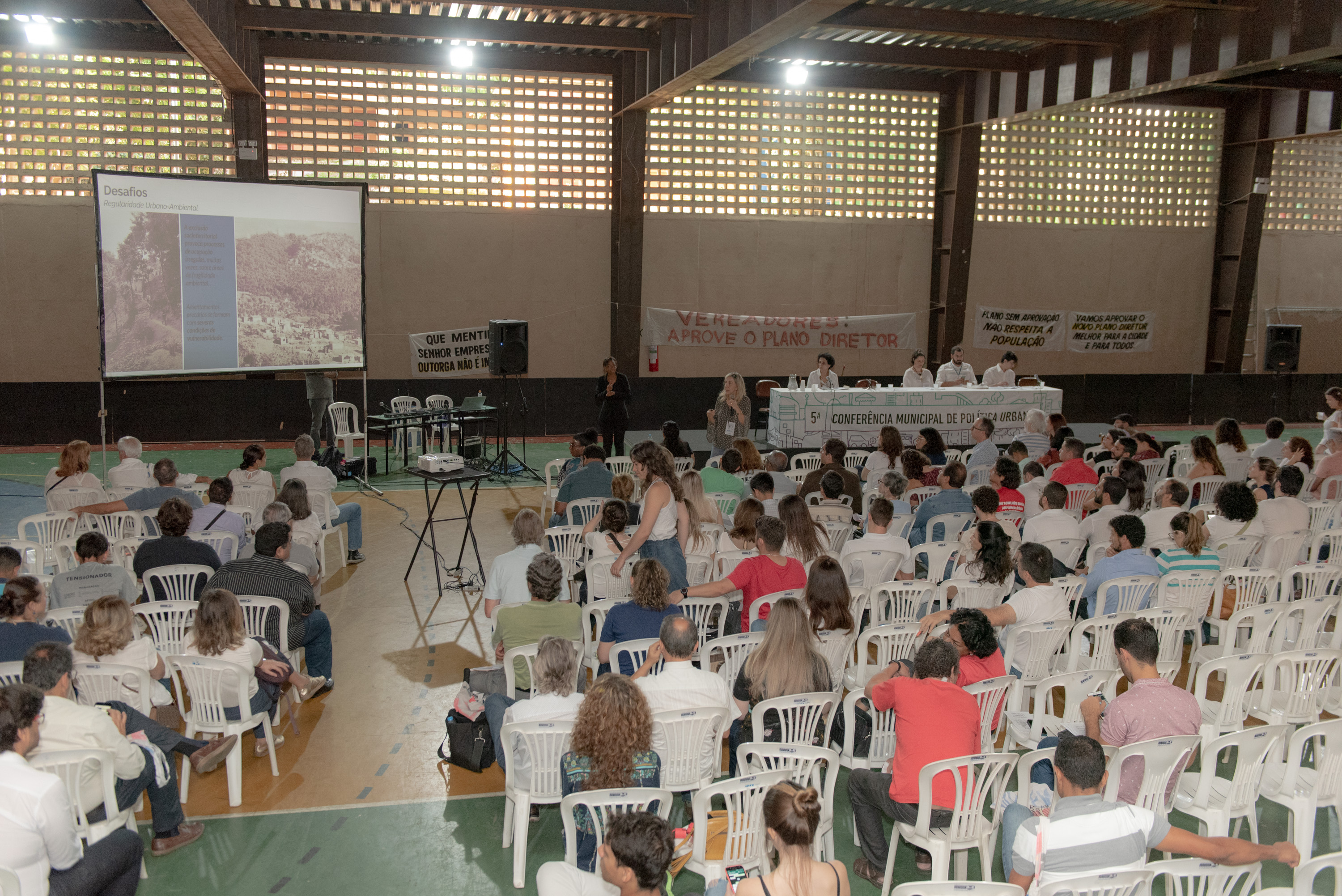5th Municipal Conference of Urban Policy of the Municipality of Belo Horizonte - Minas Gerais, Brazil.
Description
The Municipal Conference of Urban Policy is a democratic forum provided by urban legislation of the Municipality of Belo Horizonte, whose objective is to discuss the development and territorial planning of the city. The fifth edition of the Conference, held in December 2018, called the population to propose good practices to achieve principles of sustainability, resilience and inclusion, condensed in SDG 11. This proposal reflects the purpose of continuing the debate on incorporate The New Urban Agenda principles in the conduct and implementation of urban policy, reaffirming it's commitment to the document and ensuring the implementation of SDG in territory.
The 5th Municipal Conference of Urban Policy of the Municipality of Belo Horizonte addressed the development of the city under the principles of sustainability, resilience and inclusion. It counted on the participation of the community as an important agent in the achievement of The New Urban Agenda guidelines. Civil society was widely convened, with representation of universities, professional entities, non-governmental organizations, community organizations, residents and entities of specific sectoral demands and employers of industry, commerce and services, all of those linked to the urban question and legally constituted. The entries were linked to completing the public consultation "Cidades Sustentáveis", held in partnership with UN-HABITAT with Colab, in order to understand how different stakeholders in a city can align and improve their responsibilities in the area of sustainability. In its previous editions, the Conference consisted on a democratic forum for evaluating the impacts of urban development legislation on urban development. The City Council of Urban Policy, which is responsible for conducting the social participation event, decided that the fifth edition of the Conference would address the impacts of the norms that direct urban development in light of The New Urban Agenda, calling the population to also assume the responsibility in the construction of a more sustainable city for all. In order to ensure social mobilization and the maintenance of the deliberative character of the Conference, innovative initiatives were held in the city to exhibit their work and compete for UN-HABITAT and City Hall recognition. We sought to identify groups and institutions that promote actions that make the difference in search of a more just and sustainable city. They have presented projects that have changed the dynamics of the communities where they live, demonstrating how good practices can transform the reality of a territory in different aspects and how simple ideas can be replicated in different realities. The initiatives demonstrated the importance and responsibility of all to be engaged in building a better city, in dialogue with the notion of co-responsibility that was intended to be transmitted. The event was held in December 2018 and aimed to prepare a letter of collective commitments for urban development based on the principles of The New Urban Agenda. The debate, involving around 200 people, developed from three thematic axes established by SDG 11: Qualified Neighborhood Unit, Environment and Sustainable Urbanization and Inclusive Urban Mobility. The choice of themes was based on the understanding that cities are responsible for some of the challenges presented by The New Urban Agenda and can contribute to solving them in a variety of ways, among them: through neighborhood qualification strategies, in order to trade and services and facilitate walking on foot to meet daily demands; through the production of an environmentally sustainable urban space; and by promoting accessibility and low-emission urban mobility. In order to do so, technicians from several secretariats of the City Hall and civil society representatives were involved in the elaboration of a diagnosis that could support the discussion in the territory.
The City Council of Urban Policy has the responsibility to convoke the Municipal Conference of Urban Policy every four years. The Council discusses issues affecting city development in monthly meetings, but the shared decision forum of the Conference brings together a diversity of stakeholders to discuss guidelines and conducting planning and regulation of the territory. This practice of collective discussion of the urban growth model and the norms that will regulate the occupation of space is historical in Belo Horizonte. Since the 1990s, the Master Plan of the City of Belo Horizonte and its alterations, has been discussed with the citizens before being approved as law. For the 5th Municipal Conference of Urban Policy, the Council decided on the schedule and the criteria of popular participation. The forum’s preparation began in August 2018, with the Council’s mobilization, among with technical teams directed by the Department of Urban Policy and with support of various departments from the City Hall related to territorial development. The definitions of the forum were discussed in Council meetings, starting in October 2018, when the proposal to cover The New Urban Agenda guidelines in the next Conference was approved. An Organizing Committee composed by Council members was created, which was responsible for detailing the stages of the event and for the selection of innovative initiatives that would have their projects displayed in banners throughout the event. People from various social groups have presented ongoing actions that modify the socio-territorial reality of the communities where they live. Civil society in general was also widely invited to participate in the Conference through: invitations in electronic format, invitations to other municipal councils, posters posted in public buildings and in public transport, and invitations disseminated in the social networks of City Hall. In order to establish a communication channel with the population, a page was built on the City Hall website and a specific email was created dedicated to providing information about the event, including access to Colab's research in partnership with UN-HABITAT " Sustainable Cities "(http://pbh.gov.br/cmpu). The Conference was held in three stages: Opening, Working Groups and Final Plenary. The debate was developed from three thematic axes defined by Compur. At the Opening, the Executive presented the contextualization of the proposal of the new Master Plan of the City of Belo Horizonte and its dialogue with The New Urban Agenda. UN-Habitat also assisted in the process of elaborating the work dynamics and guaranteed its representation at the Opening, reaffirming its partnership with the Municipality. The dynamics of Working Groups were organized by the technical team of the Municipal Government, which prepared a diagnostic material and training workshops to support the moment of discussion. At the event, the participants were divided in groups to discuss the themes in all their complexity. At the Closing Plenary, each sector of civil society presented their resolutions. Three innovative initiatives presented good practices undertaken in their communities and the innovative initiatives of the Conference were announced.
The 5th Municipal Conference of Urban Policy of the Municipality of Belo Horizonte was one of the first initiatives worldwide to debate the guidelines proposed by The New Urban Agenda and especially SDG 11 in a shared management forum on municipal urban policy. The effort to gather budget and human resources of the Municipal Administration ensured a process of dissemination among various actors from civil society of the objectives and goals set forth in The New Urban Agenda, in addition to making possible the creation of the notion of a shared sense of responsibility for the construction of a more sustainable, resilient, safe and inclusive city. It was an important step considering the difficulties that many sectors of civil society often have in understanding the implications of global goals in the territory, on a smaller scale of time and space. At the same time, t was an opportunity for these actors to see themselves as mobilizers and entrepreneurs that can make a difference, from the local to the global level. This type of initiative is very important, especially when the city is the center of discussion, once it is built in daily life between various local actors, who have diverse demands and interests accumulated in the complexity of urban life. Although urban legislation is the main way used to regulate and order these different interests in the territory, the debate around The New Urban Agenda has expanded the possibilities for action and understanding of the role that each citizen assumes in front of his neighbors. The novelty of inviting innovative initiatives already in action in the city to the debate contributed to make the discussions more palpable and to extend the possibilities its reproduction in other territories of the city. At the same time, the possibility of creating a network of initiatives that could share their knowledge and experiences was opened. Two of the three innovative initiatives that winned the competition were initiatives of shelters of women in situations of violence. In a way, that is an example of the coverage of issues that involve the urban issue and can mobilize people and resources in the struggle for social transformation, including gender debate. At last, the process of seeking to incorporate the resolutions presented at the Conference into the Municipal Administration structure, dialoguing with existing policies and programs or establishing new projects, is a step forward in terms of the shared construction of measures that seek to achieve the SDG. In this sense, a staff of technicians from the various departments and secretariats of the City Hall has been organized to ensure that the discussions held at the conference can produce more benefits for the city.
Other reports prepared and published by the City Hall were also used for the construction of such material, such as: Municipal Inventory of Greenhouse Gas Emissions (2015, available at http://portalpbh.pbh.gov.br/pbh/ecp/comunidade.do?evento=portlet&pIdPlc…); Greenhouse Gas Emission Reduction Plan (2013, available at http://portalpbh.pbh.gov.br/pbh/ecp/comunidade.do?evento=portlet&pIdPlc…; Analysis of Vulnerability to Climate Change in the Municipality of Belo Horizonte (2016, available at http://conteudo.waycarbon.com/resumo-para-os-tomadores-de-decisao-estud…; Municipal Solid Waste Management Plan of Belo Horizonte (2017, available at https://prefeitura.pbh.gov.br/slu/plano-municipal-de-residuos-solidos/i…); Urban Mobility Plan of Belo Horizonte - PlanMob-BH (2010, available at http://www.bhtrans.pbh.gov.br/portal/pls/portal/!PORTAL.wwpob_page.show…); and Environmental Certification through the creation of the Sustainable BH Seal (2009, available at http://cesa.pbh.gov.br/scsae/index.smma;jsessionid=A01FE11541EE9B9D8A34…). The book Sustainable City, a result of the ICLEI - Local Governments for Sustainability, Latin America and the Caribbean World Congress realized at 2012 was also consulted (more information available at http://archive.iclei.org/index.php?id=579).
SDGS & Targets
Deliverables & Timeline
Resources mobilized
Partnership Progress
| Name | Description |
|---|---|
| 17.14 | Enhance policy coherence for sustainable development |
Feedback
Action Network


Timeline
Entity
Region
- Latin America and the Caribbean
Geographical coverage
Photos



Website/More information
Countries

Contact Information
Lívia de Oliveira Monteiro, Technical Adviser for Urban Policy
